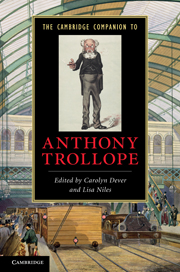Book contents
- Frontmatter
- Introduction
- 1 Trollope’s Literary Life and Times
- 2 Trollope As Autobiographer And Biographer
- 3 Trollope’s Barsetshire Series
- 4 The Palliser Novels
- 5 Trollope Redux: The Later Novels
- 6 Trollope’s Short Fiction
- 7 Trollope And The Sensation Novel
- 8 Queer Trollope
- 9 The hobbledehoy in Trollope
- 10 The construction of masculinities
- 11 Vulgarity and money
- 12 Trollope and the law
- 13 Trollope and travel
- 14 Trollope and the Antipodes
- 15 Trollope and Ireland
- 16 Trollope and America
- Further reading
- Index
- Cambridge Companions to . . .
14 - Trollope and the Antipodes
Published online by Cambridge University Press: 28 March 2011
- Frontmatter
- Introduction
- 1 Trollope’s Literary Life and Times
- 2 Trollope As Autobiographer And Biographer
- 3 Trollope’s Barsetshire Series
- 4 The Palliser Novels
- 5 Trollope Redux: The Later Novels
- 6 Trollope’s Short Fiction
- 7 Trollope And The Sensation Novel
- 8 Queer Trollope
- 9 The hobbledehoy in Trollope
- 10 The construction of masculinities
- 11 Vulgarity and money
- 12 Trollope and the law
- 13 Trollope and travel
- 14 Trollope and the Antipodes
- 15 Trollope and Ireland
- 16 Trollope and America
- Further reading
- Index
- Cambridge Companions to . . .
Summary
On both voyages Anthony Trollope made to Australia, in 1871 and 1875, he passed through the Suez Canal. Suez was not originally British in inspiration, and was not, in origin, the arterial capstone of empire it later became. This is visible in Trollope’s short story, “George Walker at Suez” (1861), where an Englishman’s unglamorous participation in the canal construction hardly bespeaks the later pivotal role that Suez played in visions of empire. In this story, the squalor of Suez is contrasted with the comforts of Friday Street in London. Yet Suez was to be the channel by which British comforts were able to reproduce themselves many times over in lands beneath the equator.
On his trips to “the Antipodes” (a term covering both Australia and New Zealand and signifying their being nearly at the opposite end of the world from Britain), Trollope had to make long-term plans: wrapping up novels before he left, conducting whirls of socializing on the advent of his departure, making complicated logistical arrangements. Yet before Suez the voyages would have been so long as to be virtually implausible. After Suez they became so routine as to be prosaic, as Trollope observed after his second journey in 1875.
- Type
- Chapter
- Information
- The Cambridge Companion to Anthony Trollope , pp. 181 - 195Publisher: Cambridge University PressPrint publication year: 2010

